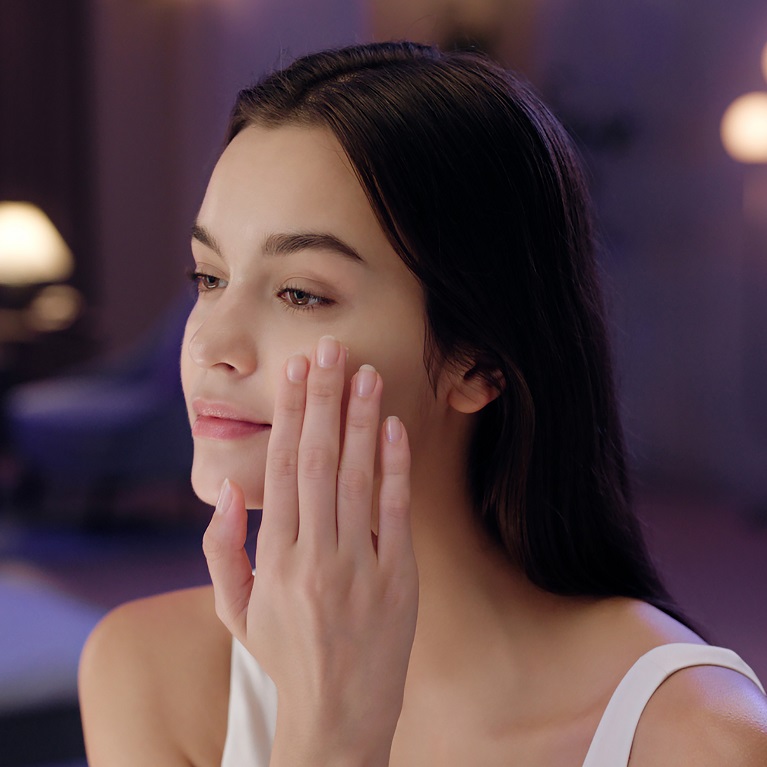Creating a nighttime skin care routine
At night, while you are sleeping and getting rest, your skin is actually still working. It’s busy repairing itself so it’s ready for another day. That’s why a good night skin care routine is essential.
“Science has proven that while we sleep our body goes into this repair process from the damages that we endured during the day,” said Jenny Lee, team leader of the Formulation Group at Amway’s East Beauty Center of Excellence in South Korea. “Sleep helps repair skin.”
You’ve heard of the body’s circadian rhythm? Your skin wants to adhere to that rhythm, too, Lee said. “Healthy skin cells peak around midnight through midday, and this repair process occurs at night while we sleep.”
Since your skin is already in repair mode, this makes your night skin care routine the ideal time to use products that target any skin care concerns you have.
You don’t need products with SPF at night like you do during the day, but there are products that make your skin more sensitive to the sun, like retinol and some acids, that can be used at night. There are also some products designed specifically for nighttime use, such as overnight face masks. Let’s take a look!
Why sleeping with makeup is bad
Like your morning skin care routine, a night skin care routine can be as basic or multi-stepped as you want it to be and will depend on your skin type. A good baseline should include cleansing, toning, treating and moisturizing. At the very least, remove any makeup you applied throughout the day.
We know it’s tempting after a long day or night to succumb to exhaustion and head straight to bed, ignoring the foundation, shadow, mascara and blush that you put on throughout the day. While it seems like the only option at the time, it’s not in your skin’s best interest.
Why is sleeping with makeup bad? The list of potential hazards includes clogged pores and breakouts, skin irritation, damaged eye lashes and premature aging, not to mention you might transfer some of it to your pillows or sheets. (Read all about it here.)
On those nights when you barely have the energy to brush your teeth, find a little more to wash your face or take off your makeup with makeup removing wipes or micellar water.
How to keep skin hydrated
Each step in your night skin care routine will benefit your skin in some way, but moisturization is especially important. Skin loses a lot of moisture throughout the day, especially if you’re in a dry environment, so it’s important to replenish it during the day and at night.
Keeping skin hydrated is also key to supporting natural skin cell turnover and strengthening the skin’s moisture barrier, Lee said. In addition to moisturizer, you can add a few other steps to your nighttime skin care routine to help while you sleep: An overnight face mask and a special pillowcase for skin.
Overnight face mask
Unlike other skin care masks you apply during the day and leave on for a short time before you rub them in or rinse them off, overnight face masks are designed to be applied after the moisturization step in your night skin care routine and remain on while you sleep.
The Artistry Skin Nutrition™ Sleeping Mask, for example, was formulated to deliver 8 hours of deep moisturization to skin while hydrating, soothing and help visibly even skin tone.
“A sleeping mask adds another layer of nourishment for added hydration. It also helps soothe and improve the appearance of skin for a brighter, more radiant complexion in the morning,” Lee said. “It’s like a lightweight blanket for your skin, basically, adding the extra layer of comfort that you didn’t know you needed.”
Plus, the Artistry sleeping mask has lavender essential oils for a soothing scent to prepare you for a good night’s sleep! (Worried about your lips, too? Apply Artistry Studio™ Pampered Pout Lip Balm + Overnight Mask to restore moisture to them overnight, as well.)
The best pillowcases for skin
Another strategy for keeping your skin hydrated is to switch to a silk pillow case. These slippery cases are common for people with textured or curly hair because hair slides right over it. That means less frizz. The silky cases also absorb less hydration from hair than cotton pillow cases.
Those are the same reasons you should consider one to support your skin. Just like for hair, the best pillowcases for skin will be silk or silky materials. That silky surface means less tugging on your sensitive skin when you toss and turn and less creases. And silk pillow cases will leave more hydration in your skin than the cotton cases that want to absorb it.
The benefits of sleep for skin
The final step of your night skin care routine is sleep itself. The human body needs a certain amount of sleep to function at its best, whether it’s our brains, muscles, blood cells or even our skin. That’s right—when it comes to skin care, beauty sleep is a real thing!
Studies show that our stress hormone, cortisol, goes down during sleep, while our sleep hormone, melatonin, goes up, Lee said. Melatonin activates enzymes that help repair skin. Skimping on sleep can raise cortisol levels and can lead to skin irritation or acne.
“Not getting enough sleep can negatively impact our skin’s appearance by increasing signs of aging and impacting our skin elasticity and texture,” she said. “Skin will also be slower to recover from daytime damages such as environmental aggressors caused by free radicals.
“Poor sleep equals poor beauty sleep. Sleep is essential to the integrity of our skin.”
Need help making sleep a priority? Read these tips for creating a bedtime routine. Looking for more skin care tips? Check out these healthy habits to support clear skin!

